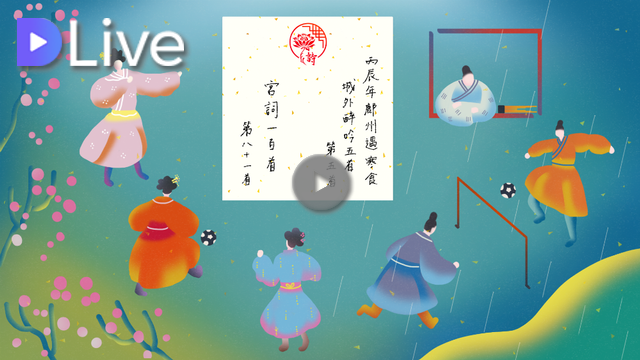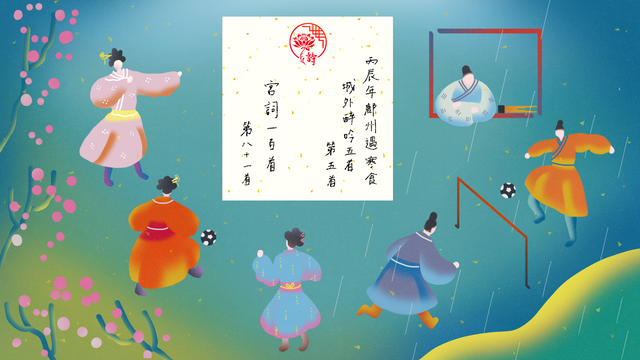Poems from the Tang Dynasty about football (Includes original song and video) |「唐詩裡的足球狂熱」 (內有原創樂曲及影片)
Hey everyone! After a long four year wait, it’s kick off time at last!! Don’t know what we’re talking about? The World Cup of course!!! As an avid football supporter, apart from knowing the teams we should also understand a bit about the game itself and how it originated. Did you know that over a thousand years ago, there were already poems from the Tang Dynasty about football?
Modern day football originated from England and is now probably the the most popular sport worldwide. The thrill of watching twenty two men chase after a ball, the coach jumping and and down from the side, and the fans cheering on, all makes this an exhilarating 90 minutes game.
So where did football actually originate from? Was it from the leading football nations like Brazil? France? Spain? In 2004, FIFA acknowledge that football originated from China from as early as the 2nd and 3rd BC and it was called “cuju” back in those days. Cu means kick, and ju is a ball, so the game started off with the same concept. Just like us today, people from a thousand years ago, from inside the palace to the normal citizens, were just as fascinated with the game, and that be seen through two poems we have for you this week..
開鑼了開鑼了!!!!終於開鑼了!!!不知我在說什麼?那你可以好好休息了...我們說的是四年一度既世界盃決賽週今天正式開鑼了!!作為專業的球迷,我們除了要認識各隊伍外,也應該了解足球的起源,足球的故事。而其實,在一千多年前,中國已有跟足球有關的唐詩!
「唐詩裡的足球狂熱」
足球,令古今中外的人都為之著迷。現代足球起源於英國,至今已成為世上最受歡迎的運動。在足球場內,草坪上的球員在努力揮灑汗水,爭奪場上唯一的足球;場邊的教練在絞盡腦汁,意圖扭轉乾坤;看台上的球迷力歇聲嘶,支持自己的愛隊。球來球往,讓人們為之瘋狂著迷。
到底足球來自哪個足球強國?巴西?法國?西班牙?世界足球協會(FIFA)在2004年頒發證明,公開確認世界上最早的足球形式,原來發源於中國的「蹴鞠」。
「蹴」就是踢,「鞠」就是皮做的球。因此「蹴鞠」就是「用腳踢球」的意思。不論是古今中外的人,也無法抵擋足球的魅力呢!以下會為大家介紹兩首關於古人在寒食節「蹴鞠」的詩,讓大家認識唐朝人熱愛「蹴鞠」的程度,可謂上至宮廷女子,下至凡夫俗子,不論男女都愛踢球呢!
From the palace「宮廷篇」
One hundred poems from the Palace #81 by Wáng Jiàn 王建《宮詞一百首-第八十一首》
宿妝殘粉未明天,總立昭陽花樹邊
sù zhuāng cán fěn wèi míng tiān , zǒng lì zhāo yáng huā shù biān
寒食內人長白打,庫中先散與金錢
hán shí nèi rén cháng bái dǎ , kù zhōng xiān sàn yǔ jīn qián
The Composition 詩句大意
One hundred poems from the Palace #81 has four lines and is best explained in 2 parts
《宮詞一百首-第八十一首》共四句,按詩的結構劃分,可分為兩個層次。
Part 1 : Getting ready in the morning 層次一:清晨的隊友集合
「宿妝殘粉未明天,總立昭陽花樹邊。」
sù zhuāng cán fěn wèi míng tiān , zǒng lì zhāo yáng huā shù biān
At early dawn in the morning, everyone is gathered by the trees under the bright sun. They still have make up residual on their faces from the previous day
在天還未亮的清晨,面上依然殘留著未卸下的妝粉,全部都站在昭陽花樹旁邊。
Part 2 : The palace maids perform freestyle football 層次二:宮女們的花式足球表演
「寒食內人長白打」
hán shí nèi rén cháng bái dǎ
On one spring day, the palace maids perform their speciality, freestyle football called bái dǎ
在寒食節這一天,宮女們表演著她們擅長的一種「蹴鞠」踢法,名為「白打」。
「庫中先散與金錢」
kù zhōng xiān sàn yǔ jīn qián 。
Funds from the safe is used to tip the girls
從庫中取出賞錢,賜予表演的宮女們。
The Poetic Structure 格律特點
Sentence 句式
There are four lines in this poem making it a quatrain (a poem that consist of four lines) , and each line has seven words, so this is classified as a 7 word quatrain.
全詩共四句,符合絕詩四句的句式特點。而全詩每句均是工整的七個字,屬於「七言絕詩」。
Highlight from the poem 精選句子
「寒食內人長白打」
hán shí nèi rén cháng bái dǎ
Bái dǎ is the modern day freestyle football where all the participants takes turn to pass the ball around. Just like modern day football, they can use any part of their body apart from their arms.
Sometimes there are specific moves, such as one called ‘mandarin duck turn’. Participants have to kick the ball using their left outer ankle to their right outer ankle and back again and keep going. If they fail they get deducted points, and the person with the most points win the bái dǎ.
As you can imagine this would have been a very elegant movement, like a dance using your feet only. So cuju was a very popular activity for the girls during the Tang Dynasty, and they often performed bái dǎ.
「白打」便是現今的花式足球,參與比賽的人們輪流踢球,有既定的傳球與接球次序。跟現代足球一樣,除了手以外的身體部份都可以觸球。
此外,「白打」會要求參賽者做出指定的動作來接球與踢球,例如其中一套動作「鴛鴦拐」,便要求先用左外足背踢,再用右外足背踢球。如果動作失誤,或者將球踢得不夠高,又或者踢出指定範圍,便會被罰分。最終罰分最少的人便是「白打」的勝者
由此可見,「白打」不像現代足球一樣充滿身體碰撞,而更像花式足球表演。對於女子來說,是體態優雅的體育項目,因此唐代女子非常喜歡「蹴鞠」,尤其常以「白打」作為表演項目。
From the Everyday Folks「民間篇」
Five Poems, written at Fū zhōu during spring in bǐng chén year #5 by Wéi zhuāng
韋莊《丙辰年鄜州遇寒食城外醉吟五首-第五首》
雨絲煙柳欲清明,金屋人閒暖鳳笙
yǔ sī yān liǔ yù qīng míng , jīn wū rén xián nuǎn fèng shēng
永日迢迢無一事,隔街聞築氣球聲
yǒng rì tiáo tiáo wú yī shì , gé jiē wén zhù qì qiú shēng
The Composition 詩句大意
Five Poems, written at Fū zhōu during spring in bǐng chén year #5, has 4 lines an is best explained in two parts寒食節
《丙辰年鄜州遇寒食城外醉吟五首-第五首》共四句,按詩的結構劃分,可分為兩個層次。
Part 1 : The natural scene on a spring day 層次一:的自然景象
「雨絲煙柳欲清明」
yǔ sī yān liǔ yù qīng míng
The misty rain falls like a shroud of smoke around the willow trees, Qing Ming festival will be here soon
雨絲落下、煙柳飄飄,清明節快要到了。
Part 2 : Entertainment on spring day 層次二:寒食節的人民娛樂活動
「金屋人閒暖鳳笙」
jīn wū rén xián nuǎn fèng shēng
While relaxing at home, we take out the fèng shēng and warm it by the fire
在家裡,人也感到悠閒,取出鳳笙以火烘培。
「永日迢迢無一事」
yǒng rì tiáo tiáo wú yī shì
There’s still some time till the end of the day, and there’s not much to do
距離一天完結還很遙遠,沒有什麼事情可以做。
「隔街聞築氣球聲」
gé jiē wén zhù qì qiú shēng 。
I can hear the sounds of people playing cuju on the street
聽到一街之隔的地方傳來「蹴鞠」的氣球聲。
The poetic structure格律特點
Sentence 句式
There are four lines in this poem making it a quatrain (a poem that consist of four lines) , and each line has seven words, so this is classified as a 7 word quatrain.
全詩共四句,符合絕詩四句的句式特點。而全詩每句均是工整的七個字,屬於「七言絕詩」。
Highlight from the poem 精選句子
「隔街聞築氣球聲」
gé jiē wén zhù qì qiú shēng
Zhù qiú is another form cuju from the old days which quite similar to modern day football. Each team has 12 or 16 people, quite a bit more than the 11 we have today!
At the beginning of the game, the two captains do a draw to decide who goes first and how many games they play, usually it ranges between 3 to 5. There is a net in between the two team, a bit like volleyball, and players’ role are well defined. The captain is responsible for kicking the ball over the net and only he can score points, and others are there to help him do that. If the captain fails to kick the ball over the net as long as it hasn’t touched the ground, the team members can continue to pass the ball to him to try again.
If the ball goes over the net, the opponent must catch it and pass it to their captain who will kick it back over the net again. The team who drops the ball and let it touch the ground loses the game. In other words, zhù qiú is a very skillful game, not only do you have to keep the ball off the ground, scoring points is restricted to one single person. If there is ever an opportunity, it would be great to get the world leading footballers to try and play this, it would be an awesome game!
「築球」是古代另一種蹴鞠的比賽形式,較貼近現今的足球比賽。「築球」是一種隊制的對抗比賽,人數分為十二人或十六人,比現今的一隊十一位隊員還要多人呢!
蹴鞠隊員的角色和職責都非常分明:球頭的職責是專門把球度過球門網中的「風流眼」,其他隊員只能負責為「球頭」創造度球的機會,而不能直接得分。
「築球」比賽開始前,雙方的「球頭」(隊長)先抽籤決定由哪一隊先開球,並商議以多少局決定勝負,一般會進行三局五局不等。
兩隊的中間會隔著球門,就像排球比賽隔著一張網一樣。球頭要用腳將皮球射過三丈高、一尺左右的球門(風流眼)。如射門不過,球撞在網上落下來,只要不落在地上,由本隊隊員接住,仍可繼續傳球與球頭,再次射門。
球射過門落入對方場地,由對方隊員接住,也依次作幾次傳球,最後傳球給球頭射門。直至球落地的一隊便輸掉一局。換而言之,古代「築球」是一場高難度的足排球比賽,既要確保過程中球不能著地,又限制只能由「球頭」得分。如果有機會的話,可以邀請現今的球星來一場「築球」比賽讓球迷們大飽眼福呢!
The Music and Drawing 《唐詩裡的足球狂熱》的歌與畫
The topic of this week’s poem is simple, it doesn’t matter if you’re from the palace or normal folks, everybody loves football and music. This week the mandarin and cantonese version of our song is performed by @susanlo and @tine respectively. The song is very upbeat, and and when you listen to it, you can immediately feel that the game is about to start.
這次的題材簡單直接,不論是官廷內的宮女,還是民間的健兒,都是熱愛足球,一起玩樂。這次的歌曲再次邀請了@susanlo 主唱國語部份,粵語部份則由@tine主唱,歌的起奏給人一種足球賽事即將開始的緊張氣氛,然後大家開始踢球了,呈現快樂的感覺!
Ok, now we’ve done the poem, listened to the song and watched the video, let’s go and watch the World Cup!!!!
詩讀完了,畫看完了,歌聽完了,那麼,準備今晚的賽事吧!今天我們不談了!
Production Team 製作團隊
Literature Translation 詩歌解析: @perlia
Music 音樂: @kona
Art 插圖: @nanosesame
Video 視頻: @aaronli
English Editor 英語編輯: @livinguktaiwan
Chinese Editor 中文編輯: @aaronli
My video is at DLive








開波喇!(只懂看帥哥球員)
睇緊live😎😎
台灣只有一個台播,其他找不到看,上網都沒。家裡有人很不高興 😣
Youtube有好幾個呀,我pm你
YouTube 有?我都找不到,都是viutv睇,早知裝now😭😭hkbn無得睇
This song should so totally be the World Cup song!!!
今晚場波好精彩😍😏穩贏!